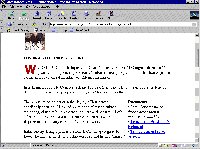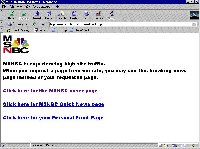|
Throughout the entire scandal, the Internet has forced the old media to do things that by training and instinct they never would have done. Rumors have been elevated to reports; if we don't report it, Matt Drudge will  or worse, because the Drudge site has the story, now it's legitimate for us to cover it. The old media is losing its understanding of its role and its values.
Marshall McLuhan once advised us that each new medium tends to incorporate the elements of the old media. A rock band in the 1980s once advised us "video killed the radio star." Is the Internet killing the "television star"? No, but it is certainly transforming it.
So what about the print media?
Every major newspaper in the United States now has a Web presence, and many of the leading papers invest enough resources to provide periodic updates throughout the day. On Friday, newspapers rushed to mirror the report on their Web sites.

So what unique value do newspapers add by putting the full text of the report online? The main contribution is mundane: overcoming the inability of the house.gov server to handle the volume of transactions it suffered Friday afternoon. While it is wonderful to have newspapers help out in this way, ultimately the role of mirror administrator doesn't require major media involvement  ISPs could do this, and someday the Internet itself will do it automatically.
Paradoxically, one of the most important roles newspapers served was to put the full text of the report in their print editions. For instance, The New York Times carried the entire Starr report on Saturday, and the Chicago Tribune did so on Sunday. "So why would I read this in a newspaper when I can get it online?" you might ask. For the same reason you buy magazines and books even when you can find the same content on the Internet: it isn't much fun to read large volumes of text online.
Of course, online text is searchable, so if you really needed to do a keyword search on an important legal term (such as "cigar" or "blue cocktail dress") the online site is the place to go.
Incidentally, news reports keep referring to the report as being "400 pages" in length. The lucky folks who rushed to convert the text to HTML on Friday had to wrestle with the same problems any of us have faced when repurposing a document from printed form to HTML. The CNN site warned readers that "pagination has been changed due to the conversion to HTML." One wonders if they considered Acrobat PDF in order to preserve pagination  and a sense of authenticity. In any event, what constitutes a "page" depends on the media. What took 400 or so pages in a three ring binder printout was far more compact in the newspaper. The Tribune packed the Starr report into 31 pages of full-size newsprint.
Newspapers still have an important value-added role to play: providing analysis to put the hard data into context. For instance, the September 14, 1998 New York Times includes a detailed chronology of Clinton's public appearances over the last few years, showing how the now-documented liaisons with Lewinsky fit into his calendar.
A Win for Citizen Involvement, or a Nation of Voyeurs?
Some media commentators have already proclaimed that this day was a triumph for getting the raw data to the citizenry, so that their opinions can be formed on the basis of the full facts.
On Friday, I conducted an unscientific test of citizen involvement with respect to the Starr report. I printed off about 25 pages of the report, and carried them to Paul Revere's Tavern in East Lansing. This establishment has a diverse crowd, from college students to construction workers to lawyers to retirees.
The actual report, straight from the Internet, proved to be a hot commodity! I handed the report to one person. The next thing I knew, people were clamoring to see pieces of the document. Pages were in hands all around the tavern. People laughed and read aloud the most lurid details.
A funny thing: not once did I hear anyone say "Look at this passage on the definition of felony perjury" or "Still, I wonder if this rises to grounds for impeachment." Nope, no one was weighing the law, or the constitutional considerations, or the weight of the moment in history. They were looking for something juicy  the hot stuff!

Maybe that's what you'd expect in a bar at happy hour. But news reports indicated that in classrooms all around the United States, high school students were doing the same thing online: finding the juiciest parts of the report and reading them out loud, laughing at each new salacious tidbit.
It's as if a sexy new novel by Jackie Collins had been dropped from the sky,
landing into millions of hands, and all of us, in a national mass frenzy, were flipping through the pages to see what "good parts" are. Yes, I'm sure Jefferson and Madison looking down from heaven in pride at how involved today's citizenry has become.
So how, pray tell, does this constitute a new high water mark for citizen involvement? Don't get me wrong: primary government documents should be available on the Internet for citizens and historians to inspect. But the rush to get this report out, and the rush to read it, had nothing to do with citizen involvement. It was voyeurism, pure and simple. I wonder how much productivity fell nationally on Friday afternoon as people stopped working on real work and headed to the Net to skim for scum?
More...
|
![]()




 Find a programming school near you
Find a programming school near you